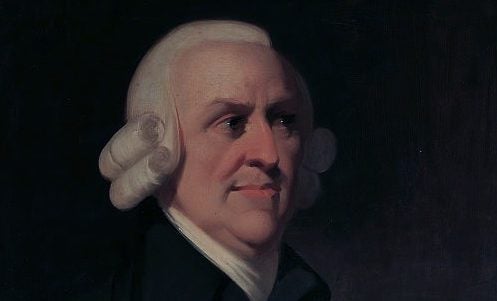An Arab thinker invented economic theory 400 years before Adam Smith did
When students study economics they learn, early on, that Adam Smith is the “father of modern economics.” This idea is one of the most basic facts of western economics—but it doesn’t stack up.


When students study economics they learn, early on, that Adam Smith is the “father of modern economics.” This idea is one of the most basic facts of western economics—but it doesn’t stack up.
A recent article in evonomics highlights the overlooked work of 14th century North African scholar Ibn Khaldun, who outlined strikingly similar ideas to those of Adam Smith almost half a millennium earlier.
Smith is known, in part, for his writing on the division of labor. He gave the example of a pin factory and showed how, if the work was shared among many individuals doing a single task repeatedly, far more would be accomplished than if every individual tried to build an entire pin themselves.
“Khaldunian thinking may be embarassingly familiar to today’s economists,” writes Dániel Oláh in evonomics. “He states that the division of labor serves as the basis for any civilized society and identifies division of labor not only on the factory level but also in a social and international context as well.”

To those familiar with Khaldun’s work, his impact is obvious. Ibrahim Oweiss, economics professor at Georgetown University, notes that Khaldun established the study of the science of civilization. “His significant contributions to economics, however, should place him in the history of economic thought as a major forerunner, if not the ‘father,’ of economics, a title which has been given to Adam Smith, whose great works were published some three hundred and seventy years after Ibn Khaldun’s death,” writes Oweiss. “Not only did Ibn Khaldun plant the germinating seeds of classical economics, whether in production, supply, or cost, but he also pioneered in consumption, demand, and utility, the cornerstones of modern economic theory.”
James Bartkus, business professor at Xavier University of Louisiana, and Kabir Hassan, finance professor at the University of New Orleans, also mapped out the similarities between Khaldun and Smith in a blog post on the subject. They note that, in his 1377 work, Al-Muqaddimah, Khaldun showed that division of labor is a necessary condition of survival by demonstrating the different tasks that must be completed to gather basic food. Khaldun wrote:
“It is beyond the power of one man alone to do all that, or (even) part of it, by himself. Thus, he cannot do without a combination of many powers from among his fellow beings, if he is to obtain food for himself and for them. Through cooperation, the needs of a number of persons, many times greater than their own (number), can be satisfied.”
In Khaldun’s view, such cooperation is necessary for survival and, from the surplus goods that result from effective cooperation, laborers can trade with inhabitants of foreign city. Years later, Smith also wrote that cooperation can lead to international trade.
Bartkus and Hassan also note that both Khaldun and Smith pointed to labor, rather than gold and silver, as the primary source of a nation’s wealth.
Khaldun sets forward his argument as follows:
“The common people who hear them think that the prosperity of these peoples is the result of the greater amount of property owned by them, or of the existence of gold and silver mines in their country in larger number (than elsewhere)… A large civilization yields large profits because of the large amount of (available) labor, which is the cause of (profit) (4:280-281).”
Whereas Smith states:
“It was not by gold or by silver, but by labour, that all the wealth of the world was originally purchased; and its value, to those who possess it, and who want to exchange it for some new productions, is precisely equal to the quantity of labour which it can enable them to purchase or command.”
Khaldun’s writing was hugely dense and rich, and also explored supply and demand, how population growth affects the economy, and tax theory—all ideas that were thought to be groundbreaking when western economists wrote on them several centuries later.
Though it’s not known whether Smith read Khaldun, it’s certainly possible, according to Oweiss. The Scottish economist might well have come across Khaldun’s ideas at Glasgow or Oxford Univeristy—even if he did not directly hear his name. “Ever since the Crusades, which lasted from the eleventh to the thirteenth centuries, most Western philosophers attempted to discount the impact of Muslim scholars through a multiplicity of approaches, which included using Muslim ideas without mentioning the name of a Muslim author,” writes Oweiss.
And so Khaldun’s work was largely forgotten in the west. Of course, in some ways, crowning a father of economics is arbitrary; there was some basic discussion of economic ideas by Plato more than 2,400 years ago. But the depth and nuance of Khaldun’s ideas is striking. “The fact remains that they were the original seeds of classical economics and even modern economic theory,” writes Oweiss.